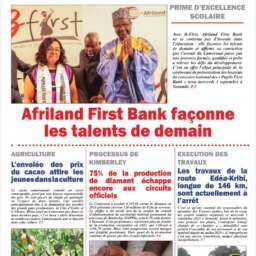(Business in Cameroon) – On July 8, 2025, Dr. Taïga, Cameroon’s Minister of Livestock, Fisheries, and Animal Industries, inaugurated the Cameroon Cooperative Farm (FCC) in Bamendjou, West Region. This agro-industrial complex, valued at 6 billion CFA francs, was initiated by Dr. Pascal Talla, a Cameroonian surgeon based in Switzerland. His investment responds to the Head of State’s call for the diaspora to invest in productive sectors.
The operation features two production buildings housing 80,000 laying hens, capable of producing 75,000 eggs daily. It also includes a self-sufficient feed manufacturing unit with a capacity of 4 tons per hour, a chick hatchery with a 40,000-head capacity, a poultry slaughtering unit, and a satellite facility in Bamena dedicated to producing egg trays.
Lowering Costs and Boosting Local Production
Conceived as an integrated project, the FCC aims to reduce the poultry sector’s dependence on imported inputs and better withstand price surges. The farm also seeks to strengthen the capacity of local producers by supplying the market with quality chicks and feed.
“We chose this sector because it supports agriculture, the local market, and food security all at once,” said Dr. Pascal Talla, emphasizing the project’s social and economic mission.
The farm has benefited from the 2013 law, revised in 2017, on incentives for private investment. This law provides tax and customs exemptions for projects deemed strategic.
According to Minister Taïga, the initiative fully aligns with the government’s import-substitution policy. “This unit will further strengthen our poultry sector’s self-sufficiency. Everything we consume is now produced locally,” he stated. With rising demand for poultry products, such integrated units could help stabilize the market, which is often vulnerable to price volatility due to feed shortages, chick supply issues, or outbreaks such as avian influenza.
Caution from Past Setbacks
While the Bamendjou farm is generating excitement, recent history calls for caution. In 2011, the Société des Produits Avicoles du Cameroun (SPAC) invested 5 billion CFA francs in a slaughtering facility in Bafang. However, it went bankrupt just months after its launch. According to explanations given in Parliament by the Minister of Finance in 2022, this was due to unsustainable production costs.
The success of the FCC will therefore depend on its ability to remain competitive, secure stable markets, and control costs in a sometimes unpredictable environment.
Despite repeated shocks from avian flu outbreaks, Cameroon’s poultry sector has shown a degree of resilience. According to data from the National Institute of Statistics (INS), broiler production rose by 18% in 2021, reaching 52,600 tons. Poultry now accounts for 19% of the country’s total meat supply, making it the second-largest source of animal protein. The arrival of strategic projects like the FCC could strengthen this momentum, provided past mistakes are avoided and sustainable models are built, supported by well-organized, competitive value chains.
Frédéric Nonos

































